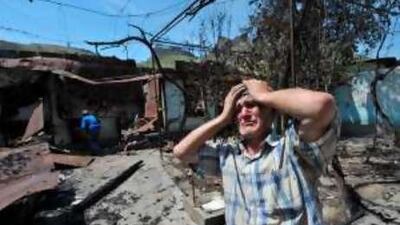MOSCOW // The era of Josef Stalin bequeathed a subtle but pernicious legacy on the post-Soviet states of Central Asia, one that has played a key role in the turmoil and carnage that erupted in southern Kyrgyzstan last week, leaving at least 124 people dead. It was in the 1920s and 1930s, under Stalin's rule, that the Central Asian nations of Kyrgyzstan, Uzbekistan and Tajikistan were established as Soviet republics and connected by arbitrary borders in the fertile Ferghana Valley.
The establishment of these borders - which Craig Murray, the controversial former British ambassador to Uzbekistan, described as a "jigsaw cut by a one-armed alcoholic" - exacerbated ethnic tensions and rivalries that have resurfaced in recent days and in part fuelled the violence between ethnic Kyrgyz and Uzbeks in the southern Kyrgyz cities of Osh and Jalal-Abad. "The borders were drawn up as the Soviets saw fit, based on mountain rivers or where farmland met the steppe, for example," said Alexei Vlasov, an expert on post-Soviet affairs with Moscow State University. "Ethnic make-up was not taken into consideration. Tajiks ended up in Uzbekistan, Uzbeks ended up in Kyrgyzstan. It created the basis for serious conflicts. There was not enough water here, not enough good land there."
The supremacy of Soviet rule made these border considerations largely superfluous, but as nationalist movements gained traction in the twilight of the Soviet empire, these demarcations created a competition for resources. Uzbekistan has space and farmland for different kinds of crops, but it has no water. Kyrgyzstan has water but little farmland or other resources. "Kazakhstan has oil and gas, but not enough people to work," Mr Vlasov said. "Ideally they could come together, but they can't find a way to cooperate."
The dying days of the Soviet Union provided an ominous indication of how the lack of a powerful centralised government could spark unrest in the Ferghana Valley. In the summer of 1990, more than 100 people were killed in violence near Osh between ethnic Kyrgyz and Uzbeks over land disputes. "The Ferghana Valley was always one of the melting pots for a possible crisis in the region," said Michael Laubsch, an expert on Central Asian affairs with the Bonn-based Eurasian Transition Group. "You don't find any other region in the area where so many ethnicities live together."
The current violence also emerged amid weakening centralised power, with the interim Kyrgyz government struggling to maintain control over the south of the country following the April ouster of Kurmanbek Bakiyev, the former Kyrgyz president who has since fled the country. "You have all of these problems coming together in this small, hidden area that geographically is more like a prison than anything else," Mr Laubsch said. "The surrounding mountains are very high and it's difficult for people to leave quickly."
Central Asia is not the only former Soviet domain upon which Stalin bestowed arbitrary borders and mass relocations of ethnic groups across the continent. He carried out such manipulations across the North and South Caucasus as well, leaving ethnic tensions festering in places like the southern Russia republics of Ingushetia and Chechnya, as well as the rebel Georgian republics of South Ossetia and Abkhazia.
The ongoing violence in southern Kyrgyzstan, however, cannot be blamed alone on ethic strife engendered by the random political demarcations in the Ferghana Valley. Experts and local residents say Osh and the surrounding areas are a cauldron of political, ethnic and criminal groups vying for influence and resources in the region. Roza Otunbayeva, Kyrgyzstan's interim president, has accused Mr Bakiyev and his backers of surreptitiously funding groups to stir up unrest and stoke ethnic conflicts in the country's south, where the deposed president could still have a power base.
The most important geographical divide in the country may now be between the north and the south of the country. Most members of the fragile interim government hail from northern Kyrgyzstan, Mr Laubsch noted. "The new government has no control over the south," he said. Akylai Karimova, a youth political activist in Osh, said she believed there are "interested parties" provoking violence in the city and attempting to aggravate relations between ethnic Kyrgyz and Uzbeks in the region. Mr Bakiyev and his supporters may have a hand in the violence, she said in a telephone interview.
Ms Karimova said, however, that animosity between the two ethnic groups in the area does not run as deep as the current violence suggests. "The local population, both the Kyrgyz and Uzbeks, understand we should not be dividing up into ethnicities," she said. "We need to survive this political crisis." @Email:cschreck@thenational.ae

